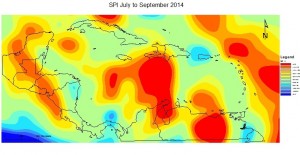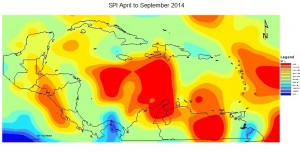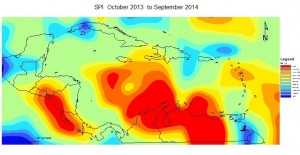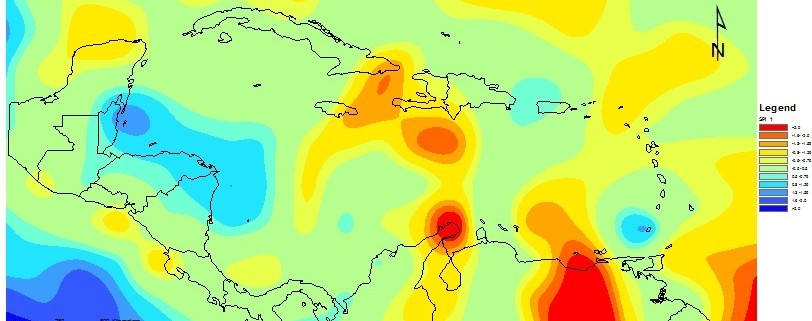SPI Monitor September 2014
SPI Discussion September 2014
September 2014
Apart from Grenada that was moderately wet, the islands of the eastern Caribbean experienced normal to below normal rainfall. Trinidad was normal to abnormally dry; Tobago, Dominica and Antigua abnormally dry; St. Kitts, Barbados, St. Vincent, St. Lucia and St. Croix normal; and Anguilla and St. Maarten moderately dry. Conditions in Guyana ranged from normal in the west to severely dry in the east. Aruba was normal while Puerto Rico was abnormally wet in the west and normal in the east. Jamaica ranged from normal in the west to severely dry in the east, but Grand Cayman was normal. Apart from the eastern extremity of Cuba that ranged from abnormal to severely dry, Cuba was predominantly normal. Belize conditions ranged from abnormally wet in the south to very wet in the north.
July to September 2014
 For the three month period, rainfall in the islands of the eastern Caribbean was normal to below normal. Trinidad, Tobago, Grenada, St. Vincent, St. Kitts and St. Croix were normal; Barbados and Antigua moderately dry; Dominica abnormally dry; Anguilla extremely dry; and St. Maarten severely dry. Rainfall in Guyana ranged from moderately wet in the west to moderately dry in the east. Aruba was normal, while Puerto Rico was moderately wet. Rainfall in Jamaica ranged from normal in the west to moderately dry in the east, but Grand Cayman was normal. The eastern and western portions of Cuba were normal, while central areas were abnormal to moderately dry. Belize ranged from severely dry in the south to normal in the north.
For the three month period, rainfall in the islands of the eastern Caribbean was normal to below normal. Trinidad, Tobago, Grenada, St. Vincent, St. Kitts and St. Croix were normal; Barbados and Antigua moderately dry; Dominica abnormally dry; Anguilla extremely dry; and St. Maarten severely dry. Rainfall in Guyana ranged from moderately wet in the west to moderately dry in the east. Aruba was normal, while Puerto Rico was moderately wet. Rainfall in Jamaica ranged from normal in the west to moderately dry in the east, but Grand Cayman was normal. The eastern and western portions of Cuba were normal, while central areas were abnormal to moderately dry. Belize ranged from severely dry in the south to normal in the north.
April to September 2014
 Normal to below normal rainfall totals dominated the six month period in the islands of the eastern Caribbean. Trinidad and St. Kitts were normal; Tobago, Grenada, St. Lucia, Antigua and Anguilla moderately dry; Barbados, St. Vincent and Dominica severely dry; St. Maarten abnormally dry and St. Croix normal. Conditions in Guyana ranged from very wet in the northwest to exceptionally dry in the east. Aruba was moderately dry, but Puerto Rico abnormally wet. Rainfall in Jamaica ranged from abnormally wet in the west to moderately dry in the east, while Grand Cayman was abnormally dry. The western half of Cuba was abnormal to moderately dry, while the east was predominantly normal. Belize rainfall ranged from moderately dry in the south to normal in the north.
Normal to below normal rainfall totals dominated the six month period in the islands of the eastern Caribbean. Trinidad and St. Kitts were normal; Tobago, Grenada, St. Lucia, Antigua and Anguilla moderately dry; Barbados, St. Vincent and Dominica severely dry; St. Maarten abnormally dry and St. Croix normal. Conditions in Guyana ranged from very wet in the northwest to exceptionally dry in the east. Aruba was moderately dry, but Puerto Rico abnormally wet. Rainfall in Jamaica ranged from abnormally wet in the west to moderately dry in the east, while Grand Cayman was abnormally dry. The western half of Cuba was abnormal to moderately dry, while the east was predominantly normal. Belize rainfall ranged from moderately dry in the south to normal in the north.
October 2013 to September 2014
 Apart from Trinidad that was abnormal to moderately wet, the islands of the eastern Caribbean were normal to moderately dry. Tobago, St. Lucia and St. Maarten were abnormally dry; Grenada, St. Vincent, Anguilla and St. Croix normal; Barbados, Antigua and St. Kitts moderately dry; and Dominica severely dry. Conditions in Guyana ranged from extremely wet in the west to abnormally dry in the east. Aruba was moderately dry, but Puerto Rico abnormally wet. Jamaica ranged from normal in the west to moderately dry in the east, while Grand Cayman was normal. Apart from western areas that were moderate to extremely wet, Cuba was predominantly normal. Conditions in Belize ranged from moderately wet in the west to normal to the south and north.
Apart from Trinidad that was abnormal to moderately wet, the islands of the eastern Caribbean were normal to moderately dry. Tobago, St. Lucia and St. Maarten were abnormally dry; Grenada, St. Vincent, Anguilla and St. Croix normal; Barbados, Antigua and St. Kitts moderately dry; and Dominica severely dry. Conditions in Guyana ranged from extremely wet in the west to abnormally dry in the east. Aruba was moderately dry, but Puerto Rico abnormally wet. Jamaica ranged from normal in the west to moderately dry in the east, while Grand Cayman was normal. Apart from western areas that were moderate to extremely wet, Cuba was predominantly normal. Conditions in Belize ranged from moderately wet in the west to normal to the south and north.
Disclaimer
The information contained herein is provided with the understanding that The Caribbean Institute for Meteorology and Hydrology makes no warranties, either expressed or implied, concerning the accuracy, completeness, reliability, or suitability of the Outlook. The information may be used freely by the public with appropriate acknowledgement of its source, but shall not be modified in content and then presented as original material.
The maps produced used SPI values calculated from monthly rainfall totals from land stations and NCEP/NCAR reanalysis data. Only land station data is used for the eastern Caribbean, described here as from Georgetown, Guyana in the south to Anguilla in the north. The Greater (and Western) Antilles is less represented by land stations. However efforts are being made to include more land stations from that part of the region. Note that the severity implied by the index is relative to what is normal for that period of consideration. Normal in the drier season reflects less rainfall than in the wetter season.



